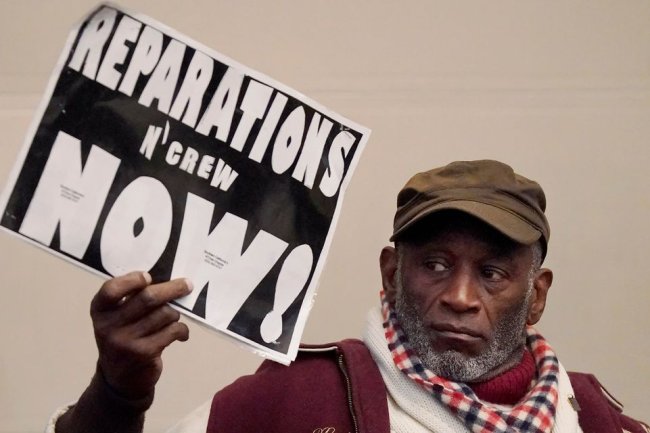Taiwan’s Vice President Plans Stop in the U.S. at a Delicate Moment
Trip by Lai Ching-te, a presidential candidate who is distrusted by Beijing, comes as the U.S. and China try to stabilize ties Taiwanese Vice President Lai Ching-te has promised to uphold the status quo with China. Photo: Walid Berrazeg/ZUMA Press By Joyu Wang in Taipei and Charles Hutzler in Washington Updated July 18, 2023 1:26 am ET The Biden administration is trying to head off trouble with China over a U.S. visit by Taiwan’s vice president, with an official saying the trip will be low key and urging Beijing not to use it to raise tensions. Lai Ching-te will stop in the U.S. on his way to and from attending the inauguration of Paraguay’s president next month, Taiwan’s Vice Minister of Foreign Affairs Alexande


Taiwanese Vice President Lai Ching-te has promised to uphold the status quo with China.
Photo: Walid Berrazeg/ZUMA Press
The Biden administration is trying to head off trouble with China over a U.S. visit by Taiwan’s vice president, with an official saying the trip will be low key and urging Beijing not to use it to raise tensions.
Lai Ching-te will stop in the U.S. on his way to and from attending the inauguration of Paraguay’s president next month, Taiwan’s Vice Minister of Foreign Affairs Alexander Tah-ray Yui said at a news briefing on Monday. Yui said Lai plans to arrive in Paraguay in the morning of Aug. 14, a day ahead of the inauguration, but didn’t offer further information on his itinerary while he is in the U.S.
Such trips are often sensitive given China’s hostility to U.S. support for Taiwan. This visit is particularly tricky for the Biden administration since Lai is campaigning for president and is deeply distrusted by Beijing.
“This is how we’ve done it in the past,” Yui said on Monday, in response to a question about whether the trip could draw China’s ire. He noted that it would be the 11th time a Taiwanese vice president has stopped over in the U.S., saying there is “no justification for any harassment.”
A Biden administration official said Sunday that Lai’s trip would hew to past such visits, with no stop in Washington, that Beijing shouldn’t take provocative actions in response, and that the U.S. is impartial in the election.
“We don’t take sides. We won’t interfere in Taiwan’s election, and we expect Beijing not to interfere either,” the official told reporters.
Chinese Foreign Ministry spokeswoman Mao Ning said at a regular press briefing on Monday that Beijing has registered an official diplomatic complaint with the U.S. over Lai’s travel plans.
“China will closely follow the situation and take resolute and strong measures to safeguard our sovereignty and territorial integrity,” Mao said.
Lai’s trip and his candidacy further complicate tentative attempts by Washington and Beijing to restore high-level contacts and stabilize ties after months of spiraling rancor. Taiwan, a democratic partner of the U.S. but claimed by Beijing as Chinese territory, has been at the center of those tensions.
Officially, Lai’s trip is known as a transit, in keeping with decades-old commitments by Washington to Beijing not to maintain formal diplomatic relations with Taiwan. Transit stops by Taiwan President Tsai Ing -wen in New York and the Los Angeles area this spring drew stern warnings from Beijing and revived concerns that China would stage threatening military exercises in response, as it did after then-House Speaker Nancy Pelosi visited Taiwan last August.
In the end, Tsai kept her public remarks few and mostly muted, including in a meeting with Pelosi’s Republican successor as speaker, Kevin McCarthy, and Beijing conducted smaller-scale exercises.
Lai’s candidacy to succeed Tsai, however, is stirring anxiety in Beijing and causing some concern in Washington too. While both are from the Democratic Progressive Party, Lai is seen as more aggressive in asserting Taiwan’s independence, a red line for Beijing. During Secretary of State Antony Blinken
in Beijing last month, Chinese officials expressed concerns that Lai’s positions would aggravate U.S.-China ties.On the campaign trail last Monday, Lai said Taiwan aspires to a closer relationship with Washington, looking forward to the day when “the president of Taiwan can walk into the White House.” The remark drew attention in the Biden administration, because a White House meeting would renege on past commitments to Beijing and upend the status quo.
As a candidate, Lai has pledged to be pragmatic in approaching relations with China and promised to uphold the status quo. In a campaign speech on Sunday, he expressed a willingness to communicate with Beijing “under the principle of equality and dignity.”
The administration official declined to say whether U.S. officials discussed Lai’s transit with Chinese officials but noted the importance of maintaining a dialogue including during times of tension.
“That is a critical part of managing competition, about maintaining channels of communication and preventing this from veering into conflict,” the official said.
Hou Yu-ih, the candidate for Taiwan’s main opposition Kuomintang, or Nationalist Party, is expected to visit the U.S. in the fall, the official said. A third candidate, Ko Wen-je, the centrist former mayor of Taipei, was in Washington earlier this year. In their campaigns, both have made relaxing tensions with Beijing a priority.
“This U.S. trip would be the most crucial opportunity” for Lai to present to Washington his vision for managing relations with China as a presidential hopeful ahead of the 2024 elections, said Arthur Zhin-sheng Wang, an expert in Taiwan-China relations at Taiwan’s Central Police University.
Wang said he expected the U.S. to take pains not to be seen as favoring any one of the Taiwanese presidential candidates to avoid exacerbating anxieties in Beijing.
“Although Beijing is going to be upset and protest anyway, it’s unlikely that it would react with military exercises like it did after Tsai’s U.S. trip in April or last year’s Pelosi visit,” he said.
Write to Joyu Wang at [email protected] and Charles Hutzler at [email protected]
What's Your Reaction?






















